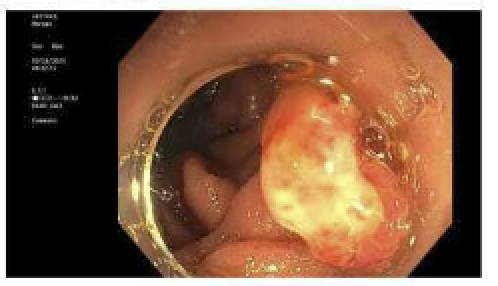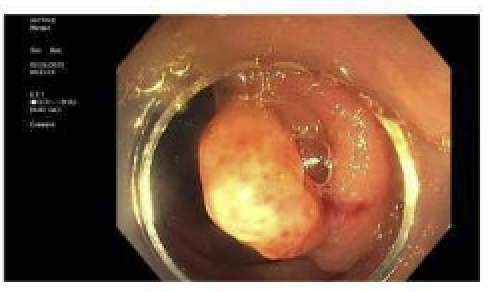Tuesday Poster Session
Category: GI Bleeding
P5274 - Pyogenic Granuloma, a Rare Cause of Obscure Gastrointestinal Bleed and Severe Anemia
Tuesday, October 28, 2025
10:30 AM - 4:00 PM PDT
Location: Exhibit Hall
- MK
Moheudin Khan, MD
United Health Services, Wilson Medical Center
Johnson City, NY
Presenting Author(s)
Moheudin Khan, MD1, Nimra Sattar, MD2, Usama Sakhawat, MD1, Toseef Javaid, MD1, Syeda Mahnoor Azeem, MBBS3
1United Health Services, Wilson Medical Center, Johnson City, NY; 2Aga Khan University Medical Center, Johnson City, NY; 3United Health Services, Johnson City, NY
Introduction: Gastrointestinal (GI) bleeding in the small intestine – distal to the duodenum – is an uncommon entity and is responsible for 4% of all cases of GI bleeding. The most common etiologies for small intestinal bleeding are angiodysplasias and tumors, responsible for approximately 70% and 10% of cases, respectively. Pyogenic granuloma (PG) is a common inflammatory vascular tumor of the skin and oral cavity that has rarely been described in the GI tract as a source of obscure and overt bleeding. In this report, we describe a case of as OGIB diagnosed as Pyogenic Granuloma by Capsule Endoscopy (CE) and resection was done with EGD.
Case Description/
Methods: A 71-year-old man had been suffering from general fatigue, melena and severe anemia for several months. His hemoglobin levels were 8.5 g/dl. EGD and colonoscopy did not reveal any significant bleeding. Consequently, PillCam study was performed showing fresh blood in distal duodenum and proximal ileum suggesting bleeding.
Repeat EGD was performed showing an 8 mm sessile ulcerated polyp in the proximal jejunum. Resection of polyps was done with histology revealing pyogenic granuloma. 04 weeks follow up in the GI clinic showed marked improvement of Iron deficiency anemia and resolution of Melena.
Discussion: Pyogenic granuloma is a rare benign vascular lesion of the GI tract from the oral cavity to the anus. Some cases are incidentally found during screening colonoscopies, other cases present with overt or occult GI bleeding leading to severe anemia. Very few cases of small bowel PG are reported in the literature as indicated a recent case series from 2020 with only 35 reported cases. The treatment is usually endoscopic resection with a snare polypectomy for smaller lesions while larger lesions may require a surgical intervention.
Pyogenic granuloma is a rare, benign vascular lesion that can occur anywhere along the GI tract, from the oral cavity to the anus. Some cases are discovered incidentally during routine screening colonoscopies, while others present with overt or occult GI bleeding that can lead to significant anemia. Pyogenic granulomas of the small bowel are difficult to diagnose, as they are usually inaccessible via conventional endoscopic techniques. This Patient had to undergo multiple Endoscopic procedures prior to visualizing the rare source of GI bleed. Treatment typically involves endoscopic resection using snare polypectomy for smaller lesions, whereas larger lesions may necessitate surgical intervention.

Figure: Jejunal image showing polyps with granulomatous lesion

Figure: Jejunal Images on EGD
Disclosures:
Moheudin Khan indicated no relevant financial relationships.
Nimra Sattar indicated no relevant financial relationships.
Usama Sakhawat indicated no relevant financial relationships.
Toseef Javaid indicated no relevant financial relationships.
Syeda Mahnoor Azeem indicated no relevant financial relationships.
Moheudin Khan, MD1, Nimra Sattar, MD2, Usama Sakhawat, MD1, Toseef Javaid, MD1, Syeda Mahnoor Azeem, MBBS3. P5274 - Pyogenic Granuloma, a Rare Cause of Obscure Gastrointestinal Bleed and Severe Anemia, ACG 2025 Annual Scientific Meeting Abstracts. Phoenix, AZ: American College of Gastroenterology.
1United Health Services, Wilson Medical Center, Johnson City, NY; 2Aga Khan University Medical Center, Johnson City, NY; 3United Health Services, Johnson City, NY
Introduction: Gastrointestinal (GI) bleeding in the small intestine – distal to the duodenum – is an uncommon entity and is responsible for 4% of all cases of GI bleeding. The most common etiologies for small intestinal bleeding are angiodysplasias and tumors, responsible for approximately 70% and 10% of cases, respectively. Pyogenic granuloma (PG) is a common inflammatory vascular tumor of the skin and oral cavity that has rarely been described in the GI tract as a source of obscure and overt bleeding. In this report, we describe a case of as OGIB diagnosed as Pyogenic Granuloma by Capsule Endoscopy (CE) and resection was done with EGD.
Case Description/
Methods: A 71-year-old man had been suffering from general fatigue, melena and severe anemia for several months. His hemoglobin levels were 8.5 g/dl. EGD and colonoscopy did not reveal any significant bleeding. Consequently, PillCam study was performed showing fresh blood in distal duodenum and proximal ileum suggesting bleeding.
Repeat EGD was performed showing an 8 mm sessile ulcerated polyp in the proximal jejunum. Resection of polyps was done with histology revealing pyogenic granuloma. 04 weeks follow up in the GI clinic showed marked improvement of Iron deficiency anemia and resolution of Melena.
Discussion: Pyogenic granuloma is a rare benign vascular lesion of the GI tract from the oral cavity to the anus. Some cases are incidentally found during screening colonoscopies, other cases present with overt or occult GI bleeding leading to severe anemia. Very few cases of small bowel PG are reported in the literature as indicated a recent case series from 2020 with only 35 reported cases. The treatment is usually endoscopic resection with a snare polypectomy for smaller lesions while larger lesions may require a surgical intervention.
Pyogenic granuloma is a rare, benign vascular lesion that can occur anywhere along the GI tract, from the oral cavity to the anus. Some cases are discovered incidentally during routine screening colonoscopies, while others present with overt or occult GI bleeding that can lead to significant anemia. Pyogenic granulomas of the small bowel are difficult to diagnose, as they are usually inaccessible via conventional endoscopic techniques. This Patient had to undergo multiple Endoscopic procedures prior to visualizing the rare source of GI bleed. Treatment typically involves endoscopic resection using snare polypectomy for smaller lesions, whereas larger lesions may necessitate surgical intervention.

Figure: Jejunal image showing polyps with granulomatous lesion

Figure: Jejunal Images on EGD
Disclosures:
Moheudin Khan indicated no relevant financial relationships.
Nimra Sattar indicated no relevant financial relationships.
Usama Sakhawat indicated no relevant financial relationships.
Toseef Javaid indicated no relevant financial relationships.
Syeda Mahnoor Azeem indicated no relevant financial relationships.
Moheudin Khan, MD1, Nimra Sattar, MD2, Usama Sakhawat, MD1, Toseef Javaid, MD1, Syeda Mahnoor Azeem, MBBS3. P5274 - Pyogenic Granuloma, a Rare Cause of Obscure Gastrointestinal Bleed and Severe Anemia, ACG 2025 Annual Scientific Meeting Abstracts. Phoenix, AZ: American College of Gastroenterology.
